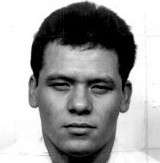Irineo Montoya was executed by the State of Texas for the murder of John Kilheffer
According to court documents Irineo Montoya and a friend were picked up hitchhiking by John Kilheffer. Soon after Montoya would stab the man to death before robbing him and stealing his vehicle
Irineo Montoya would be arrested, convicted and sentenced to death
Irineo Montoya would be executed by lethal injection on June 18 1997
Irineo Montoya Photos

Irineo Montoya Case
Mexicans and some international groups today harshly criticized the execution in Texas on Wednesday of a Mexican citizen convicted of murdering an American motorist.
The Government, which lost an 11-year battle to save the life of the Mexican, Irineo Tristan Montoya, delivered a diplomatic protest note to the United States Embassy here, the Foreign Ministry said. In a statement, the ministry called the death penalty ”cruel and inhuman.”
Mexico does not have a death penalty outside of military courts.
Mr. Tristan, a 30-year-old onetime fisherman, was convicted in 1986 of the stabbing death and robbery of John Kilheffer, who offered him and another hitchhiker a lift along a highway just north of Texas’s border with Mexico. After the execution of Mr. Tristan was postponed three times, he was put to death Wednesday.
Watching through a glass window at the Huntsville, Tex., maximum security prison, Mr. Tristan’s father and wife witnessed the death by lethal injection. Later they told reporters that Mr. Tristan’s last words were, ”Goodbye, I’ll wait for you in heaven.”
That and other tearful scenes, reported in newspapers and on the airwaves today, fanned a national wave of sorrow and solidarity.
”Indignation!” said the headline in La Jornada, a Mexico City paper, above a photo of Mexicans protesting Mr. Tristan’s execution.
Television stations broadcast interviews with Mr. Tristan’s weeping relatives, many of whom gathered on the international bridge separating Matamoros, Mexico, from Brownsville, Tex.
”This represents a triumph of barbarism over civilization,” said Oscar Gonzalez, a leader of the Mexican Academy of Human Rights. ”We feel that in the case of Hispanos and Mexicans in the United States, there is a failure in the application of justice.”
Mr. Tristan was the first Mexican citizen to be executed in the United States since March 1993, when Ramon Montoya Facunda was put to death for killing an American police officer. Mr. Montoya’s execution was the first of a Mexican in the United States in more than four decades.
Mr. Tristan’s death came despite protests, not only from the Mexican Government, but from international opponents of capital punishment, including Amnesty International and a coalition of American lawyers. The critics have argued that American authorities have violated the treaty rights of at least 30 foreigners on death row in the United States, including Mr. Tristan.
Thirty-three other Mexican citizens are on death row in 10 states.
Mexican Government officials argued in earlier diplomatic protests to Washington that Mr. Tristan’s arrest violated a provision of the Vienna Convention because the Texas police failed to inform him of his right to contact Mexican officials for legal help.
”After a lengthy police interrogation conducted without the benefit of counsel, Mr. Tristan reportedly signed a four-page confession in English, a language he did not speak, read or write,” said an open letter sent to Gov. George W. Bush of Texas earlier this week. It was signed by Amnesty International’s secretary general and 15 other British, Canadian, American and Mexican human rights activists and lawyers.









